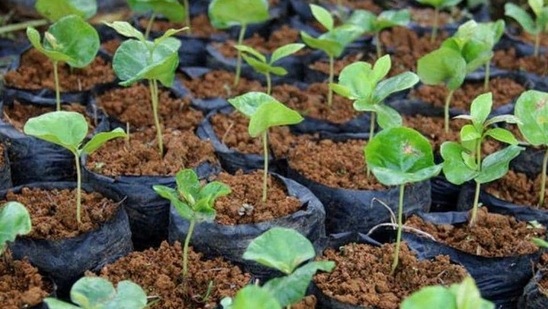50-75% saplings planted in Delhi between 2016-19 survived: Audit by FRI
VK Dhawan, forestry expert at FRI Dehradun, who is leading the plantation audit for the Arvind Kejriwal-led government in Delhi, said that the plantation between 2016 and 2019 was analysed based on field data, and it was found to be “good”.
The survival rate of new saplings planted in the National Capital between 2016 and 2019 has been between 50% and 75%, which is considered “good”, according to the third-party plantation audit conducted by Forest Research Institute, Dehradun.

VK Dhawan, forestry expert at FRI Dehradun, who is leading the plantation audit for the Arvind Kejriwal-led government in Delhi, said that the plantation between 2016 and 2019 was analysed based on field data, and it was found to be “good”. “After analysing data from all the divisions of the Delhi forest department, we have come to the conclusion that the survival rate of plantation in Delhi has been between 50 and 75%, which is good.”
Around 6.7 million new saplings were planted in Delhi during the plantation season from June to September, between 2016 and 2019. The Delhi forest department had planted more than 3 million saplings last year, too.
He explained that 40-50% survival rate is considered “average”, 50-70% is considered “good”, 70-80% survival rate is considered “very good”, and 80-90% is considered “excellent”.
The Aam Aadmi Party (AAP) government had roped in FRI experts to conduct the plantation audit for the Delhi forest department, to ascertain an overall picture of the survival rate of new saplings planted in the city, the kind of species planted, and the benefits of planting such species. On Tuesday, FRI experts said that a draft audit report, the initial findings of which has been accessed by HT, will be submitted before the Delhi government this week, and the final report will be released by July-end.
The environment department had also directed all other greening agencies in the city, including Delhi Development Authority (DDA), three municipal corporations in Delhi (east, north and south), New Delhi Municipal Council (NDMC), and the Public Works Department (PWD) among others, in 2019, to conduct similar third-party audits to ensure more effective plantation drives.
Delhi environment minister Gopal Rai said that FRI has completed its audit. “FRI Dehradun has completed analysing plantation between 2016 and 2019. The final report will be released by July end,” he said.
The report suggested that the Delhi government focuses more on planting of native varieties, instead of exotic species, Dhawan added. “We have noticed that the Delhi forest department chooses very good plant species, and have largely planted native species, medicinal varieties, species that are known to control pollution levels and increase oxygen levels among others. They have also planted varieties of Ficus — that are known to be good for birds as they feed on the seeds — in many parts. So, the choice of species has been good, but there are some areas in the Capital where exotic species were planted, which require more care and are also not good for the ecology around it.”
Exotic plant varieties require more water and nutrients from the soil, compared to native species.
He said that exotic species such as bottle brush, varieties of eucalyptus, and others were found more around central Delhi.
The FRI, in the report, has also given a detailed plan for the eradication of Prosopis juliflora or mesquite, which is an invasive species like Kikar, that interferes with the growth of native species planted around it. FRI experts have mentioned that the Kejriwal government must ensure “gradual removal” of this species by clearing the seeds and shortening the canopy of trees.
“We have suggested to the Delhi government to consider planting along the Yamuna Pushta area since a lot of plants are being affected due to flooding of the river during monsoons. Either additional plantation should be done there, or plantation should be focused on parts where it is not affected by flooding,” Dhawan said.
Meanwhile, environment experts said that such a third-party plantation audit will act as a “guiding document” for future plantations in the city. “Such third-party evaluation helps in assessing survival rates, drawbacks where growth is not up to the mark, and implement strategies to improve the efforts in the following years. Such plantation drives are organised every year, and it is important to know how many new saplings have survived, to fix accountability on the agencies,” said CR Babu, professor emeritus, Centre for Environment Management of Degraded Ecosystems, Delhi University.




